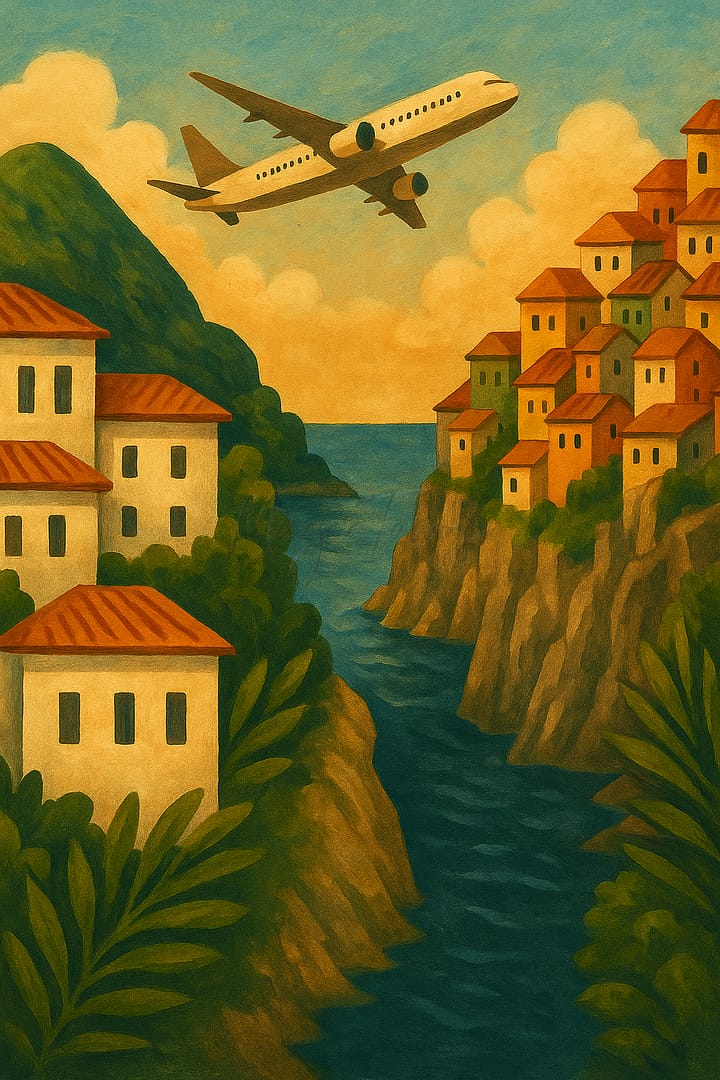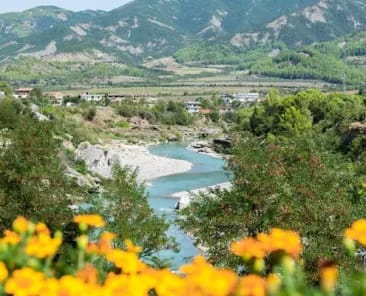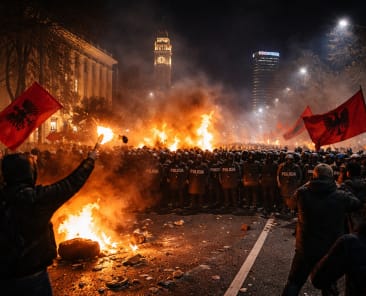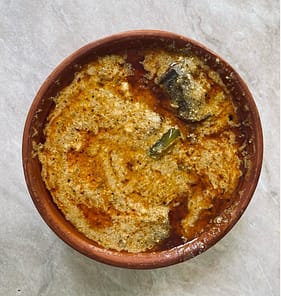When it comes to relocating to a new country, it’s always a bit of a challenge. There’s a lot to think about before you pack up your life and move it somewhere totally new.
Albania has become a pretty popular destination lately, especially for remote workers and expats looking for something different. On the other hand, Italy is already one of Europe’s most well-known countries to relocate to and for good reason. So, I thought it’d be fun (and useful) to compare the two side by side.
For this guide, I teamed up with my Italian colleague, Anna, who shared her honest take on what life in Italy is really like. And, I’ve added my perspective from Albania, based on living here myself.
Hope this helps you get a clearer idea of what Albania vs. Italy can look like when it comes to relocating.
Cost of Living in Albania
Living in Albania is generally considered affordable (especially for people who’ve moved here from the US or countries in Western Europe).
You can live modestly with €1,000 per month, enjoy a more comfortable lifestyle with €1,200–€1,800, and anything over €1,800 allows for a luxury lifestyle. These all depend on the area where you’re living, the rent price, whether you’re living alone or are a couple/family, your lifestyle, etc.
I’ve broken down a detailed guide on how much you need to live comfortably in Tirana, based on my experience living here.
Cost of Living in Italy
The cost of living in Italy really depends on where you live and your lifestyle. In major cities like Milan or Rome, rent for a one-bedroom apartment in the city center usually ranges from €800 to €1,300 per month. In smaller towns or more rural areas, you can also find places (like two-room flats) between €400 and €800.
For groceries, a single person can comfortably spend around €200 per month if cooking at home. Utilities (electricity, gas, water, heating) typically cost between €100 and €180 per month, while the internet averages around €20 a month. A mobile phone plan is also quite affordable, usually around €10 per month.
All in all, someone living modestly in a smaller city might spend around €700-€1,000 per month (just for living, excluding extras). In larger cities or with a more comfortable lifestyle, monthly costs can rise to €1,200-€2,000.
- Setting up Utilities in Italy
- How to Find a Shared Flat in Italy
- A Comprehensive Rental Guide for Expats in Italy
Transportation in Albania
Getting around Albania is pretty straightforward. Buses are available and operate within the city, and to connect other cities with each other. Personally, I almost never use buses. Despite it being an affordable means of transportation, the conditions are not that good (the bus system is not yet upgraded, plus it gets crowded). On the other hand, you might have heard that driving in Albania is a bit challenging and the traffic is a real issue sometimes…
There are people who prefer biking or using scooters (which have been pretty popular in the recent years).
When it comes to exploring the cities, they’re pretty walkable. Even bigger cities like Tirana are simple to explore within one, or just a few days.
Transportation in Italy
Italy is quite good in terms of transportation, although it largely varies from region to region.
High-speed trains like Frecciarossa and Italo make traveling between major destinations quick and comfortable, for example, you can get from Rome to Milan in under three hours. If you’re on a budget, regional trains are a slower but more affordable option, with short trips often costing between €8 and €12.
As you head further south, however, the network becomes patchier. Trains and buses run less frequently and don’t reach as many towns or rural areas, which can make travel more challenging.
Urban transport also reflects this divide. In cities like Milan, public transport is really good, with metro lines and buses reaching almost every part of the city. In cities like Rome, on the other hand, buses can be unpredictable and delays are common. Because of this, many locals rely on scooters or bikes to get around. Thankfully, most cities now offer convenient sharing services, with rentals typically costing between €0.20 and €0.30 per minute.
Visas and Residency in Albania
Albania has one of the most relaxed visa policies in Europe, so the country is especially appealing for expats, digital nomads, and retirees. Citizens of the EU, the UK, the US, and many other countries can enter visa-free and stay between 90 days and 1 year, depending on their nationality.
For example, Americans can stay up to 1 year without a visa, while many others (like Canadians and Australians) get 90 days within a 180-day period.
If you plan to stay longer, you’ll need to apply for a residence permit. There are different types available – for work, study, family reunification, or retirement. You’ll typically need to show proof of income or employment, a rental contract or property ownership, and health insurance.
Need help relocating to Albania? Feel free to contact us for a stress-free process!
The process is relatively straightforward, especially if you’re staying in Tirana or working with a local lawyer. Many expats describe it as easier and more flexible compared to other European countries. Plus, the government has introduced long-stay permits for digital nomads and remote workers, making it even more attractive for location-independent professionals.
Visas and Residency in Italy
Italy is part of the Schengen Zone, so citizens from many countries (including the US, Canada, the UK, Australia, and others) can stay visa-free for up to 90 days within any 180-day period. This is perfect for short visits, but if you’re planning to settle in, you’ll need a long-stay visa.
There are several visa options depending on your situation:
- Elective Residency Visa
- Work Visa
- Self-Employment Visa
- Student Visa
- Digital Nomad Visa
Once in Italy, you must apply for a Permesso di Soggiorno (residence permit) within 8 days of arriving. This legalizes your stay and is mandatory for all non-EU nationals living in Italy long-term.
While the process can involve a bit of paperwork and patience (especially in smaller towns), many expats find it manageable, especially when supported by relocation services.
Taxes in Albania
Albania’s tax system is relatively straightforward and often considered friendly for small businesses and freelancers.
- Income tax is progressive, ranging from 0% to 23% depending on your earnings.
- Self-employed individuals with an annual turnover of up to ALL 14 million (around €130,000) benefit from a 0% tax rate until the end of 2029.
- Corporate tax sits at a flat 15%, and the standard VAT rate is 20%, with a reduced 6% for certain goods and services.
Taxes in Italy
Italy’s tax system includes several components:
- Income Tax (IRPEF): Progressive rates ranging from 23% to 43% on personal income.
- Regional and Municipal Taxes: Additional taxes set by local authorities, usually a small percentage of income.
- Corporate Tax (IRES): Standard rate of 24% on company profits.
- Value Added Tax (VAT): Standard rate of 22% on most goods and services.
- Wealth and Property Taxes: Applicable on assets and property holdings.
Italy offers specific regimes like the Impatriate and Flat Tax Regimes to attract expatriates and high-net-worth individuals, which can provide tax relief.
Digital Nomad Friendliness
Albania is quickly becoming a favourite among digital nomads for good reason. It’s affordable, meaning you don’t need to be making six figures to live well here. You can work from anywhere, whether from a café in Gjirokastër, Berat, Durrës, or a trendy co-working space in Tirana, your money stretches a lot further compared to other European destinations.
The capital, in particular, has a growing remote work scene with plenty of spaces to plug in, meet other creatives, and network.
Infrastructure is improving considerably, but still behind Italy in some regions.
Digital Nomad Friendliness
Italy is a good place to work as a digital nomad. Apart from big cities, which of course are always a good choice, you can find many towns near the mountains (like Cortina D’Ampezzo), or the beach (Sardinia is my favourite) with a good internet connection and/or co-working places.
Healthcare in Albania
Healthcare in Albania is generally affordable, but the quality can vary depending on where you are. In major cities like Tirana, you’ll find private clinics that offer quick and reasonably priced services.
Public healthcare is available and low-cost, but it’s not as developed as in Western European countries, and language barriers can be a challenge in smaller towns.
Many foreigners opt for private insurance to cover everything from general check-ups to specialist visits, just for peace of mind. Overall, if you’re staying in or near a city, you’ll have access to decent care without breaking the bank.
If you’re looking for travel insurance in Albania, you can get an instant quote now from our partner, Albsig.
Healthcare in Italy
Healthcare in Italy is widely regarded as one of the best in the world because it offers high-quality services that are often accessible and affordable. For example, you might pay a small fee for a specialist visit or for certain medical tests, but emergency care is free.
However, sometimes people choose private healthcare, not for the quality but mostly because it often offers shorter wait times.
Also read: Healthcare in Veneto, a Comprehensive Guide for Expats and Visitors
Education in Albania
The Albanian education system is still developing, and while it offers free public schooling, many expat families prefer private or international schools, especially in Tirana. Education is compulsory from ages 6 to 16, starting with primary school (9 years total), followed by secondary education.
At the upper secondary level, students can choose between general education and technical training programs. University education is available and relatively affordable, but resources and teaching methods can vary widely across institutions.
While the system leans toward traditional teaching styles, some private schools are adopting more modern, student-centred approaches. Overall, options are best in the capital, with fewer choices in smaller cities or rural areas.
Education in Italy
The Italian education system is often considered somewhat traditional, with a stronger emphasis on rote learning and theoretical knowledge compared to some other countries that favor group work and presentations.
Compulsory education in Italy runs from ages 6 to 16, divided into primary school (5 years), followed by lower secondary school (3 years). Upper secondary school (typically 5 years) offers three main paths: “Liceo” is more academic, primarily preparing for university; “Istituto Tecnico” focuses on practical skills for specific sectors, potentially leading to employment or university, while “Istituto Professionale” provides job-specific training (like esthetician etc.).
At the end of upper secondary school, students take the ‘Maturità’ exam, which includes written and oral components across various subjects, and the final grade is out of 100.
Public vs. Private Schools for Expat Families
Real Estate in Albania
Buying property in Albania is relatively straightforward, and foreigners can purchase real estate without restrictions (except for agricultural land, which requires setting up an Albanian company). The process is simpler than in many EU countries, but it’s still important to work with a trusted notary and legal advisor to avoid issues with outdated property records or unclear ownership titles.
Property prices are significantly lower compared to Western Europe, especially outside of Tirana or coastal hotspots like Saranda and Vlora. However, they can be considered relatively high according to the Albanian standard (especially in recent developments in the main areas in Tirana).
Real Estate in Italy
Buying property in Italy is relatively straightforward, but it involves several steps:
- Codice Fiscale: Essential for property purchase. Obtain it from the local tax office or Italian consulate.
- Preliminary Agreement (Compromesso): A binding contract outlining terms, signed by buyer and seller.
- Notary (Notaio): A public official who oversees the final deed (Rogito) and ensures legal compliance.
- Deposit: Usually 10-30% of the purchase price, paid upon signing the preliminary agreement.
- Final Deed: The notary formalises the sale; the balance is paid.
Language Barriers in Albania
In touristy areas and main cities, English is spoken widely, especially by the younger generation. Other spoken languages include Italian, Greek, and a minority of people might also know a bit of Russian (the older generation). Elsewhere, basic Albanian goes a long way.
Language Barriers in Italy
Italians are usually really (really) open and available when a foreigner tries to speak their language, so it’s rare for an Italian to judge you on how you speak. So even if you have a basic level, it’s the right country to dive in. However, if you’re looking for a job and don’t speak Italian, your options will naturally be limited to sectors like tourism, teaching or large international companies where English is the primary language.
Airport Access & Connectivity in Albania
- Tirana International Airport (TIA) is 25 mins from the city center.
- New airports in Kukës and Vlorë are improving coastal access.
- Budget airlines like Wizz Air & Ryanair operate, among others.
Airport Access & Connectivity in Italy
Italy is well-connected by air, especially from its major cities. The main international hubs are Rome Fiumicino and Milan Malpensa, but several “smaller” cities like Venice, Bologna, Florence, Naples and Palermo also have international airports.
All of them offer convenient links to city centers, but keep in mind: not all have direct train connections. Some rely on shuttle buses, usually departing near train stations and costing between €5–€15.
Proximity to Other Countries from Albania
Albania might not be in the heart of Europe, but it’s surprisingly well-connected for travelers who love exploring nearby countries. You can drive to Montenegro, Kosovo, or North Macedonia in just a few hours, and Greece is right next door, making weekend getaways super easy.
From Tirana International Airport, there are frequent budget flights to cities like Vienna, Milan, Istanbul, Rome, and Barcelona, often under two hours. And with Wizz Air and Ryanair operating in the country, spontaneous trips don’t have to break the bank.
Albania’s location along the Adriatic also makes it a great jump-off point to the Balkans, whether you’re flying, driving, or ferry-hopping across the Ionian Sea.
Proximity to Other Countries from Italy
Italy’s central location in Europe makes it a perfect base for travel lovers. It borders France, Switzerland, Austria, and Slovenia, which means quick access to neighboring countries, whether by plane, train or even bus. You can fly from Milan to Paris in just over an hour, or take a train and arrive in about 6.5 hours. From Turin, you can hop on a bus and be in Lyon, France, in just 4 hours.
In the northeast, cities like Trieste are so close to Slovenia and Croatia that cross-border grocery shopping is a regular thing, many Slovenians and Croatians come to Italy for cheaper goods.
Grocery Prices in Italy, Croatians Realise They’re The Expensive Neighbours
Rome, Milan, and Venice are also incredibly well-connected to the rest of Europe. You can be in Barcelona, Berlin, or Paris in under two hours by plane. You can also easily reach Sardinia and Corsica by ferry, two of the most popular summer destinations for Italians.
All in All: Albania vs. Italy
Albania and Italy share a similar Mediterranean vibe. Sunshine, warmth, a love for good food, and friendly people. In many ways, the energy feels the same. But when it comes to relocating, the right choice really depends on your lifestyle and priorities.
If you’re looking for something more affordable, relaxed, and easygoing, Albania might be your place. If you’re after structure, stronger infrastructure, better healthcare, and don’t mind a higher cost of living, Italy could be a better fit.
Both offer great experiences. It just comes down to what you want out of your next chapter.





